Suppose a terrorist buys radioactive material from the Russian mafia, smuggles it into the United States, packs it around explosives, and sets its off in a major city, leaving a smoking, radiating ruin. Such a scenario no longer seems farfetched in the wake of Sept. 11.
But while the possible diversion of weapons of mass destruction into terrorist hands should have topped the agenda at last week’s U.S.-Russia summit, the issue was barely raised in a meeting that was long on down-home hospitality and short on substance.
This was supposed to be a different kind of summit. Drawn together as new allies in the war on terrorism, presidents George Bush and Vladimir Putin were supposed to meet in Crawford, Texas, and close the book on the Cold War. They would conclude a deal that would trade deep cuts in offensive nuclear weapons for greatly relaxed restrictions on missile-defense testing, and thereby usher in a new era of the nuclear age.
In fact, the Crawford summit failed to achieve even its most modest goals. Bush and Putin continued to disagree over missile-defense testing and the future of the Anti-Ballistic Missile (ABM) Treaty. And while both presidents said they would slash their still-massive strategic nuclear arsenals, there is much less to those commitments than meets the eye.
In the end, Putin returns to Moscow with mostly empty hands, making future cooperation on securing weapons stockpiles less likely.
In failing to meet Putin at least halfway on the ABM treaty, Bush may have secured his ability to go his own way in the short term?allowing him to build a missile defense he says will protect the United States against “rogue” nations with nuclear bombs. But he did so at a cost?possibly increasing the long-term risk to a United States targeted by terrorists.
As Bush and Putin admitted in their joshing before high school students in Texas, their disagreement on missile defense centered on the ABM treaty. That treaty bars the deployment of nationwide defenses and restricts anti-missile testing. Those restrictions were meant to keep both countries vulnerable to attack, so neither would launch a first strike.
Given his desire to build a “shield” against missile attacks, Bush considers the treaty outdated, even dangerous. Putin, on the other hand, views the agreement as a cornerstone of international stability and believes that steep reductions in offensive nuclear weapons are possible only if future defenses remain strictly limited.
At a meeting in China three weeks ago, Bush and Putin signaled that a deal reconciling these views was in the offing. U.S. officials hinted that they could live with the ABM treaty for a time if Moscow allowed the Pentagon to proceed with a robust missile-defense testing program. Putin, in turn, hinted that Russia could live with some testing as long as the treaty remained in effect.
Only one stumbling block remained. Putin insisted that any deal be codified in a formal agreement, while Bush wanted it to be an informal understanding. By Tuesday, when the presidents met at the White House, it became clear that this question of how to record their agreement was a deal-breaker.
This setback makes it all but certain that the United States will soon unilaterally abandon the ABM treaty. The Pentagon has warned for months that its ongoing testing program is bumping up against the treaty. Withdrawing from the treaty will come as no surprise?Bush has signaled his intent to do so since taking office. But that decision will nonetheless evoke an outcry in Moscow, at home and among America’s friends.
Still overkill
The only real news to emerge from the three days of meetings was Bush’s pledge to reduce U.S. offensive nuclear weapons to 1,700-2,200 over the next decade?down from the 7,000 weapons currently deployed. Putin indicated that Russia, too, would reduce its strategic weapons to a level equal to or possibly below that of the United States.
The numbers themselves were not a major breakthrough. In 1997, former presidents Bill Clinton and Boris Yeltsin agreed to negotiate a treaty to reduce U.S. and Russian forces to 2,000-2,500 warheads. That negotiation was never concluded, because of the missile-defense issue.
Bush’s unilateral commitment is a welcome effort to restart this stalled arms-control process. Still, some perspective is in order. Bush proposes to phase in the cuts over 10 years, leaving plenty of time to reverse course if, as a senior administration official suggested, there were “changes in the world that might necessitate a change in our thinking.” What’s more, the administration is pledging only to retire warheads. It is not saying it will destroy them, which leaves open the possibility that some or all will be put in storage and thus available for deployment if the need arises.
Nevertheless, even if the United States goes down to 1,700 operational warheads by 2011, it will mean that?more than two decades after the Cold War ended?the U.S. nuclear arsenal will still be larger than the Soviet Union’s during the 1962 Cuban Missile Crisis.
Moscow wants to cut its nuclear arsenal to save money. Still, Putin spoke about weapons cuts only in broad terms. He did not say how long it would take Moscow to dismantle its weapons or which weapons it would retire. And, like Bush, he said nothing about whether he would destroy warheads or just store them.
These discussions of details and numbers obscure the important reality that we have far more weapons than we need today. As President Kennedy adviser McGeorge Bundy said more than 30 years ago: “A decision that would bring even one hydrogen bomb on one city of one’s own country would be recognized in advance as a catastrophic blunder; 10 bombs on 10 cities would be disaster beyond history; and a hundred bombs on a hundred cities unthinkable.”
In other words, even if Russia became our enemy again, we would still have more than enough weapons to deter a nuclear attack.
Treaties and trust
There is an additional problem with the announced weapons cuts: The relatively small reductions are not going to be enshrined in a treaty. Without that legally binding agreement, promised cuts may not be made or could be easily reversed.
Putin is all for formalizing promises. At a press conference with Bush on Tuesday, he said Russia prefers to “present all our agreements in a treaty form.” He argued that a nation’s security cannot be based solely on trust.
But Bush rejects this trust-but-codify approach. Although he somewhat testily offered to write last week’s commitments “down on a piece of paper,” he clearly regards arms-control negotiations and treaties as relics of the Cold War.
For him, treaties hark back to the days when the relationship between the United States and the Soviet Union was one in which the only thing the two countries could agree on was not to annihilate each other. He sees reciprocal unilateralism as a better approach for the beginning of what he called “a new relationship based upon trust and cooperation.”
Bush’s view has some appeal. A world without formal constraints on weapons would give the United States tremendous flexibility to respond to unanticipated threats?including by increasing the size of its arsenal.
But the president’s approach runs two great risks. One is that flexibility is a two-way street. By failing to codify the unilateral cuts, Russia, too, gains the ability to change its mind.
And even if the Bush administration is right that Russia has become a country like Britain or France, in which mutual trust is indeed a defining characteristic of our relations, failing to codify the force-reduction commitments has the potential to derail the cuts.
Ambiguity about the nature, pace and extent of the unilateral commitments is sure to arise. That could easily draw Congress and the Russian parliament, the Duma, into the fray. Will the Duma accept Russian reductions if the United States walks away from the ABM treaty? And if Russia drags its feet on reducing its arsenal, will Congress still buy into the idea that unilateral cuts are a good deal? We could find ourselves in a new stalemate.
A greater danger
The failure to get the deal done in Crawford is bad enough. Having too many missiles around would make the catastrophe all the greater should they one day be used. Worse still, continuing friction makes it more difficult to take joint action to tackle a more pressing threat: the vulnerability of Russian nuclear, chemical and biological weapons materials to terrorist theft.
Sept. 11 leaves no doubt that terrorists like Osama bin Laden will use weapons of mass destruction if they get their hands on them. The most ready source is Russia’s vast stock of weapons and materials?often secured in only the most primitive ways. Just this month, Russian government sources acknowledged a nuclear-security violation in Russia within the past two years of the “highest possible consequence.” While the details are vague?and it doesn’t appear that weapons were lost this time?the report alarmed many security experts.
The Bush administration has, all along, been slow to tackle this threat?even cutting funding for highly effective programs to assist Moscow in securing and dismantling this most dangerous of Soviet legacies. Over the past decade, the United States has spent several billion dollars to dismantle Soviet missiles, increase security at storage facilities and pay weapons scientists to conduct research for peaceful purposes.
But the issue of protecting Russia’s weapons stockpiles was reportedly barely mentioned in Crawford.
By focusing their discussions on the old, Cold War agenda of arms reductions and missile defense?and failing to reach agreement?Bush and Putin missed a major opportunity. The real promise of Crawford was that it might allow our two countries to move beyond the issues of yesterday so that we could, together, meet the threats of tomorrow.



Commentary
Op-edStrategic Failure: U.S., Russia are Losing Momentum to Reduce Nuclear Risk
November 18, 2001